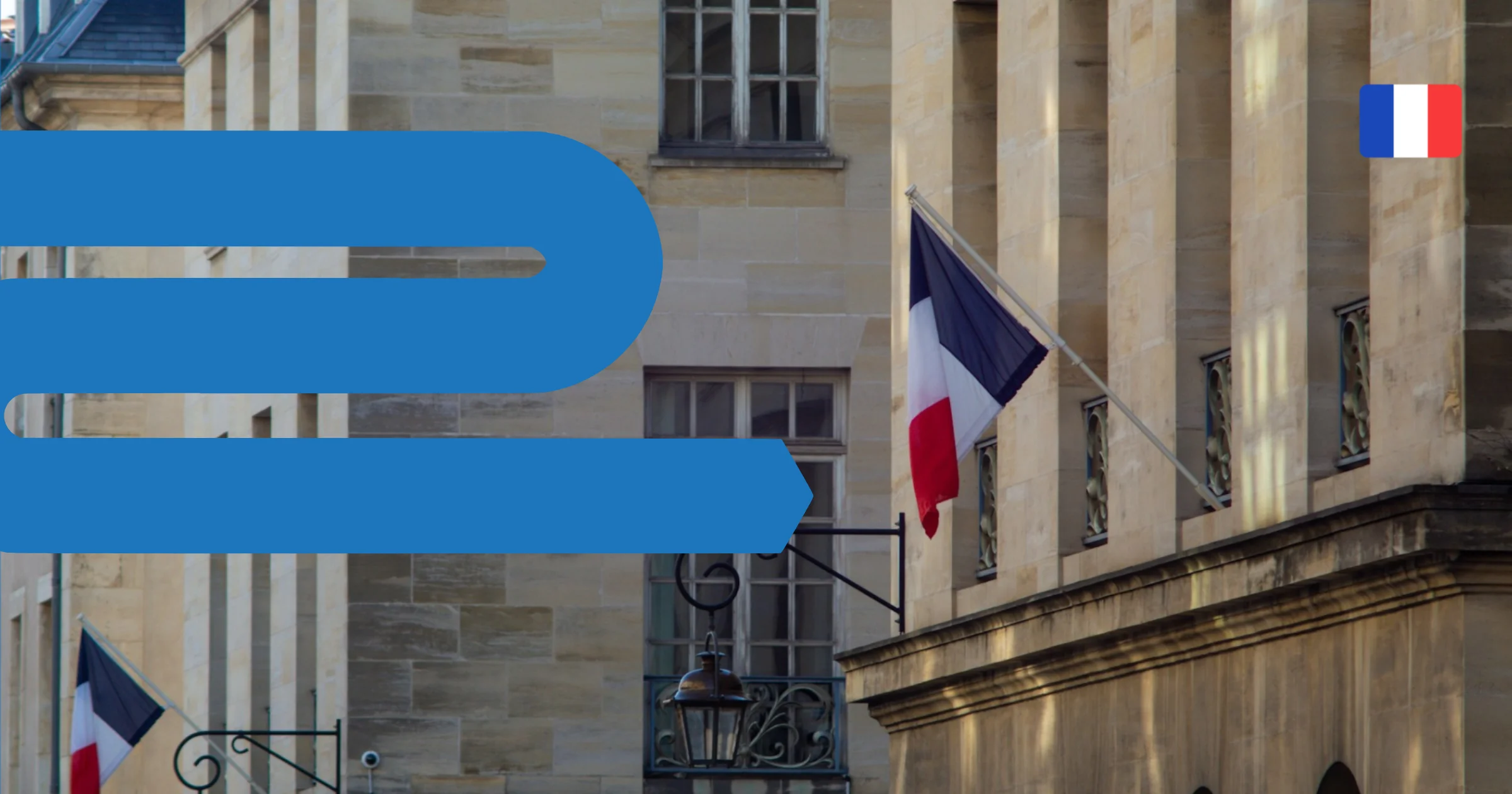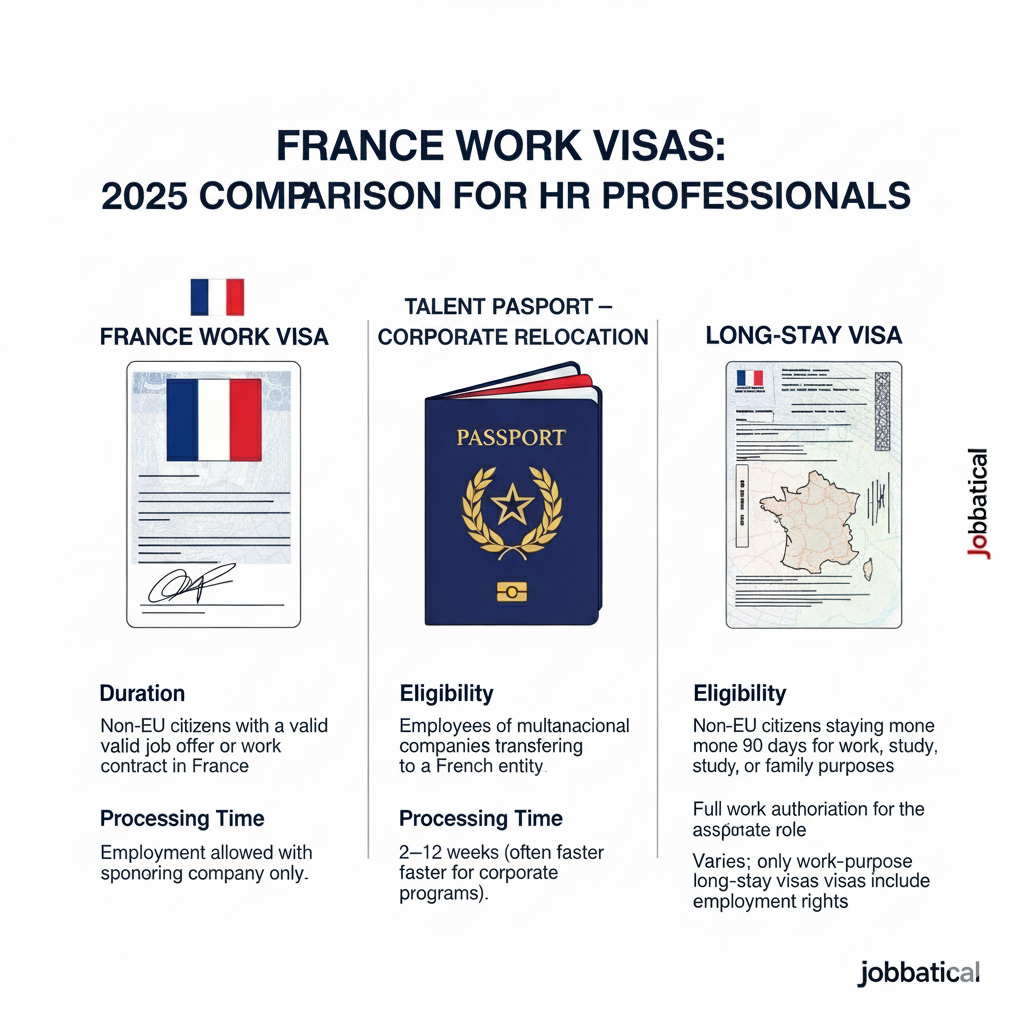- France Work Visa: Best for direct hires with a French job offer; eligibility needs valid contract; processes in 2-12 weeks; lasts 12 months (renewable); limits work to sponsoring company; family can join but with work restrictions; counts toward 5-year permanent residency.
- Talent Passport (Corporate Relocation): Ideal for intra-company transfers in multinationals; requires assignment letter; fast-tracks in 2-12 weeks; valid 1-4 years; full work rights for assigned role; spouse can work, kids study; qualifies for long-term residence with continuous stay.
- Long-Stay Visa: Flexible for various purposes like work, study, or family; eligibility varies by category; takes 2-10 weeks; lasts 4-12 months (renewable); work rights only in employment types; family reunification available; most categories count toward residency.
- HR Tips: Choose Work Visa for new French hires; Talent Passport for relocating existing talent; Long-Stay for non-work needs. All lead to permanent residency after 5 years of compliance, aiding talent retention.
France Work Visa vs Talent Passport vs Long-Stay Visa: 2026 Comparison for HR teams
As HR leaders in B2B companies, managing global talent mobility is key to attracting top performers and ensuring smooth international relocations. With France's evolving immigration rules in 2026, selecting the right visa pathway can streamline hiring, reduce compliance risks, and support employee retention. This guide compares the France Work Visa, Talent Passport (Corporate Relocation), and Long-Stay Visa, focusing on how they impact corporate recruitment, family support, and long-term residency for your workforce.
Understanding the France Work Visa for Corporate Hiring
The France Work Visa (VLS-TS salarié) is a practical choice for B2B HR teams onboarding non-EU talent directly into French roles. It supports various contract types, helping you fill positions efficiently while meeting labor regulations.
Key Features for HR leads
This option suits HR strategies for local hires in sales, tech, or operations roles within France.
Talent Passport for Corporate Relocation: Streamlining Global Mobility
For B2B firms with international operations, the Talent Passport – Corporate Relocation (Passeport Talent: Salarié en Mission or ICT) facilitates seamless transfers of key personnel, minimizing disruptions and boosting cross-border collaboration.
Key Features for HR teams
Leverage this for relocating managers or specialists, aligning with your global talent management goals.
France Long-Stay Visa: Versatile Option for Diverse HR Needs
The France Long-Stay Visa (Visa de Long Séjour) offers flexibility for B2B HR handling multifaceted relocations, serving as an entry point for work, family, or study while leading to residence permits.
Key Features for HR managers
Use this for non-standard scenarios like executive training or family-based moves.
2026 Comparison Table: HR-Focused Insights
This overview helps HR evaluate costs, timelines, and benefits for budgeting and compliance.
Selecting the Right Visa for employees in 2026
As an HR mobility manager:
- France Work Visa for straightforward recruitment of external talent into French positions.
- Talent Passport for efficient internal relocations, prioritizing family-friendly policies.
- Long-Stay Visa for broader needs like professional development or family support.
Pathways to Permanent Residence: Long-Term HR Benefits
These visas enable permanent residency after 5 continuous years, provided adherence to tax, social, and integration rules. This fosters employee commitment, reducing turnover in your B2B operations.
Closing Insights for HR and Global mobility teams
In 2026, these French visa options empower B2B HR to optimize global hiring and relocations. By aligning choices with business needs, you can enhance talent acquisition, ensure regulatory compliance, and build a resilient international workforce. Consult experts for tailored guidance on France visa requirements.
Disclaimer:
Immigration laws and policies change frequently and may vary by country or nationality. While we strive to provide accurate and up-to-date information, we recommend doing your own due diligence or consulting official sources. You're also welcome to contact us directly for the latest guidance. Jobbatical is not responsible for decisions made based on the information provided.


.svg)











.svg)
